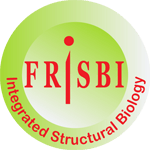FRISBI


The insect cells platform of South Paris is located on two sites. One is focused on production of eukaryotic multi-protein complexes (Responsible: Pascal Drevet, Laboratoire de Biologie Structurale et Radiobiologie, CEA Saclay) and the second is focused on the production of 15N, 13C and 2H labeled proteins for NMR applications (Responsible François Bontems, Laboratoire de chimie et biologie structurales, ICSN, Gif sur Yvette)
In tight collaboration with Imre Berger from Frisbi Grenoble node, we implemented the MultiBac system to produce high molecular weight multi-protein complexes. This system allows the concatenation of individual protein and complexes in a stepwise or combinatorial manner with no theoretical limit in the number of partners. Insect cells (Sf21 or Hi5) are cultivated in suspension in rotary shaker allowing up to 3L unitary production. The YFP present on Bacmid is use as a protein production reporter. The production of YFP is followed on a fluorometer or a FACS to stop the culture at the optimum of proteins production. After cell breakage proteins are purified on an AKTÄ Pure dedicated to this platform. SDS-PAGE and Western blot are conducted on purified protein as quality control. In the context of Frisbi proposal, viruses are prepared in advance in the laboratory. One or two persons from the proposal can then spend ten days to be formed to insect cells production and to obtain the first production on their biological systems. From 2014, our Platform accepts some 5-6 projects a year according to their arrival and feasibility as well as the added value of insect cells expression. We already made 20 external project and 40 internal project. For some projects we reached up to 20mg of purified proteins by 400ml culture even with large eukaryotic proteins or complexes.
Most NMR applications rely on the labeling of the studied system with stable isotopes (15N, 13C, 2H). In collaboration with the Unité de virologie structurale (Institut Pasteur), we develop low cost procedures to label proteins expressed in Drosophila Schneider 2 (S2) or Spodoptera frugiperda Sf9/Sf21 cells. We currently propose 15N-uniform labeling with yields comparable to those obtained with commercial optimized media. We also work on 2H or 2H,15N-labeling solutions and on the suppression of a strong transaminase activity we observed in S2 cells to enable efficient amino acid type specific labeling.
We dispose of the material to small-scale productions (up to 100 ml), which appeared sufficient to obtain an NMR sample (200 µl at several hundred of µM) for most of the proteins we have tested. We will shortly acquire a new incubator to guarantee production up to 500 ml. The platform is mainly devoted to projects for which the molecular biology part is already done and the production already tested. However we can provide a support to produce baculovirus or to establish transformed S2 cell lines.